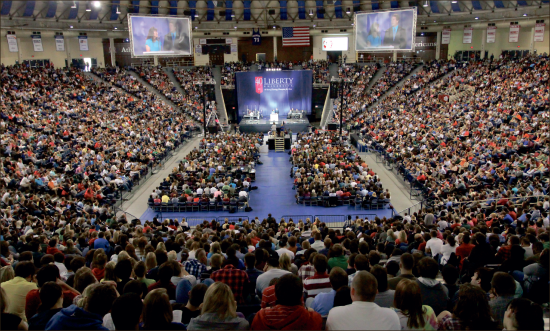
Exponential — From a handful of students meeting under a tent in the mud, convocation has grown to over 36,00 in weekly attendance in the Vines Center. Photo credit: Ruth Bibby
The story of Liberty University’s first 40 years
Over the past four decades, Liberty University has grown exponentially and with its growth new opportunities have been brought to students and alumni alike.
Founded in 1971 by Dr. Jerry Falwell as Lynchburg Baptist College, Liberty was always part of a bigger plan according to Liberty University Chancellor Jerry Falwell Jr.
“His (Dr. Falwell Sr.) vision for Liberty was a distinctively Christian university where every faculty member was a committed Christian, where the fundamentals of the Christian faith were never compromised and where the code of conduct encouraged behavior that is in keeping with Biblical morality,” Jerry Falwell Jr. said.
While Liberty has remained focused on this vision, the school has undergone many changes, both extracurricular and academic, over the past 40 years, Jerry Falwell Jr. said.
Liberty University alumni Winnie Taber, Brad Butler, Tamara Park and Darrell Jordan graduated in the class of 1975, 1984, 1993 and 2002 respectively. Each remembers a uniquely different Liberty, but a common thread of foundational faith is found in each of their stories.
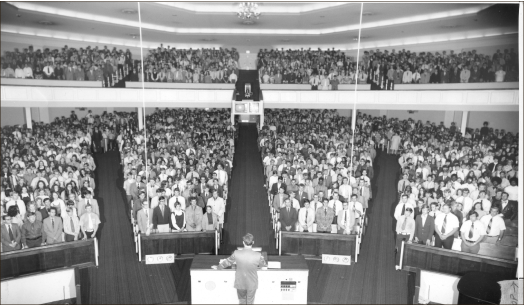
Roots run deep — Dr. Jerry Falwell wanted his university to be rooted in the local church. Thomas Road Baptist Church was that anchor. Photo provided
Graduating with a degree in Elementary Education, Taber went on to receive her Masters in Education as well as her education specialist in Administration. Taber has served as principal of the upper school at Liberty Christian Academy and is now Assistant Superintendent of Curriculum and Instruction at the school. She is also currently a professor at Liberty. Similar to Taber, Butler also found that the foundation he acquired at Liberty was fundamental to his future.
Butler graduated with a degree in Political Science. Having worked in Washington for a number of years, Butler discovered that his foundation from Liberty was most necessary when God changed the direction of his career.
“God ushered in a number of significant changes for me, one of which was a career change. In that sense, Liberty proved the lessons they taught us there and instilled in us were a benefit,” Butler said. “A career change can be a devastation. I believe it was easier because of the spiritual lessons I learned at Liberty.”
Butler is now a Contract Administrator for Wiley Wilson, an architectural, engineering and planning firm.
Graduating with a degree in Telecommunications, Park found it was not the university itself that helped her to succeed, but the steps Liberty took to push her forward in her career pre-graduation.
“It hasn’t been the degree from Liberty that has been most beneficial, but rather the experiences and friendships that have enriched me in both career and life,” Park said. “One example, during my sophomore year I did an internship in Brussels, Belgium at a Christian media outlet. Shortly after graduation, I went on to produce videos in Brussels for the next couple of years.”
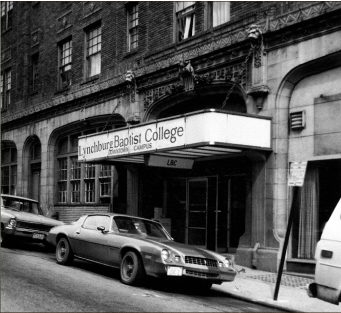
Old school — Before Liberty University was born on Liberty Mountain, Lynchburg Baptist College called a downtown plaza and a James River island home. In the late 70s, Lynchburg Baptist College became Liberty Baptist college. It was not until the 80s that Liberty became “Liberty University.” Photo provided
Now a producer and author, Park currently produces a TV series called Nobel Exchange for Halogen. She is also author of the book “Sacred Encounters from Rome to Jerusalem.”
Also having entered into the world of communication, Jordan graduated with degrees in both communication studies and sports management.
“The greatest things I learned at Liberty were the broadcast production and video editing skills that I learned through the communications program,” Jordan said. “Another valuable thing I learned was the value in doing an internship. My sports management program required an internship before graduation. My internship at Comcast SportsNet led to my first job.”
Since its beginning, Liberty has been producing graduates with the drive and ability necessary to succeed in their given field, according to Director of Liberty’s Alumni Relations Tyler Falwell.
Beginning in 1971, Liberty’s student body has grown from 154 students to a graduating class of 10,930 and a student body has grown from 154 students to a graduating class of 10,930 and a student body numbering more than 60, 000.
With the growth of the student body many changes have occurred in the academic realm, as well as student recreation.
“When I graduated, the school was smaller and a close community where you knew almost everyone,” Taber said. “We were all a family.”
Athletics have also played a role in Liberty’s growth, according to Taber.
“We had a tremendous men’s basketball team where the coach not only made an impact on his players but also on the students,” Taber said. “His name was Dan Manley. They slowly added other sports like football and cheerleading.”
Jordan also appreciates the involvement of sports in student life.
“Because I played football, I didn’t participate in many other student recreation opportunities at Liberty,” Jordan said. “Being a part of the team was a great experience for me.”
For Butler it is not only the number of students or sports community that made his experience different, but also the presence of the founder.
“The biggest difference is that there is no Jerry Falwell Sr.,” Butler said. “The university is moving farther and bigger than any of us thought so soon. Jerry Falwell Jr. is responsible for the extensive growth, but it is a little sad not having Jerry Sr. around to see the dream come true.”
The sense of community, Taber remembers, is what sets Liberty apart from many schools — a tradition that started with Falwell Sr.
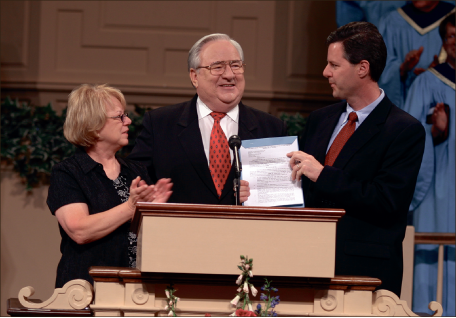
The Falwells — Falwells receive the deed to the Ericsson building, which has become Green Hall. Photo provided
“(Dr. Falwell) knew us by name. I had the opportunity to travel some with him when he would fly to speak at different places. He was a prankster. I also worked as a student in his office area,” Taber said. “You never knew what he was going to do to scare you. I loved the fact that he was not only a pastor with a servant’s heart, but he also was right in there having fun with all of us students.”
Carrying his father’s legacy Jerry Falwell Jr. is also a friend to the current student body, Butler said.
“Jerry Falwell Jr. emulates his dad to a ‘t’ by really enjoying the student body. Students have a lot of access to him. When I was up in the Chancellor’s booth last Saturday night, I was in awe of how many kids could come through and say hi to the Chancellor,” Butler said. “You don’t see that. It creates openness with the student body. Both Jerry Sr. and Jerry Jr. took that to heart and they exemplify what they talk about. It is that kind of personal involvement with the student body that makes Liberty unique.”
As changes have taken place in the number of students, and the face of the leadership, the campus has not been left behind.
“(When I was a student) there were two campuses: Treasure Island and The Hotel. We had classes everywhere: the lobby of the church, the balcony of the church, the houses across from the church, the rented Ruffner Elementary School, etc,” Taber said. “We shared the cafeteria with Lynchburg Christian Academy for lunch. Those were the days.”
Treasure island is an island in the middle of the James River that once had dormitories and a kitchen for the first group of Liberty students.
Liberty still owns the islands, however, the bridge was washed away in the 80s by flooding. So, the university no longer utilizes the island.
The hotel was a renovated hotel that students inhabited as they outgrew the island. They hotel is still located in Lynchburg, but is now owned and operated by the YWCA.
“We rode to classes on school buses, walked across the bridge at Treasure Island because they were concerned that the bridge would not hold the bus and the students at the same time,” Taber said. “Several times Treasure Island flooded while I was there. We simply put what we brought on the top bunk and left the Island.”
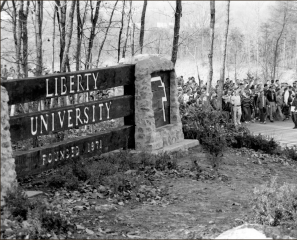
Growing up — Liberty University has grown from 154 students to more than 60,000 in 2011. Photo provided
Not only have there been architectural changes, but also technological advances that offer current students new opportunities, according to Park.
“I suspect a thousand little and large changes have been made since I attended – from dress code to the construction of new buildings,” Park said. “However the most significant change I see is the embrace of technology, especially in the field I’m in (television).”
Currently, students have access to facilities and academics comparable to those of other large universities around the world, according to Falwell Jr.
“The biggest difference (between 2002 and 2011) at Liberty is the facilities,” Jordan said. “LU’s campus has exploded with new state-of-the-art academics and athletic buildings. The place looks totally different than when I was there.”
“There was never a dull moment at Liberty — something was always happening,” Jordan said.
Not only is Liberty a university that strives to best accommodate their students while they are on campus, but it also strives to maintain those relationships post graduation, according to Tyler Falwell.
“The key to all of this is staying connected. We can have the greatest publications in the world, but if we do not have your current address, telephone number and email then they will never reach you,” Tyler Falwell said.
Other alumni keep in touch with the on-goings at Liberty through different methods, too.
“I maintain my alma mater by keeping in contact with faculty, like one of my favorite professors Mrs. Deborah Huff,” Jordan said. “In addition, this year I started the position of TV Analyst for the Liberty football broadcasts for Flames Sports Network. This provides a unique opportunity for me to be a part of the sports program.”
Liberty serves as more than an institution to its students and alumni, Butler said.
“At Liberty I was taught the value of giving my best,” Taber said. “Dr. Falwell drilled into us that if it is Christian, it should be better, and it stuck with me.”
The school’s commitment to Christian principles and character are factors that go on to impact students long after they leave, Jordan said.
“My LU education provided a solid foundation for academic and personal success,” Jordan said. “Because Liberty stresses the importance of character in addition to academic success, it makes you a better all-around person, which makes you a better employee.”
Lessons such as the one Taber and Jordan learned are a common thread between graduates of Liberty, Butler said.
“Particularly professor (Dr.) Bill Gribbin who taught the concept of principle that God has a plan even when it is not always evident,” Butler said. “We can usher in the changes and embrace with confidence that God is watching over us and going to take care of us. You don’t learn those values anywhere else, there is a spiritual element you don’t get at other institutions. We learned there are no wasted experiences.”